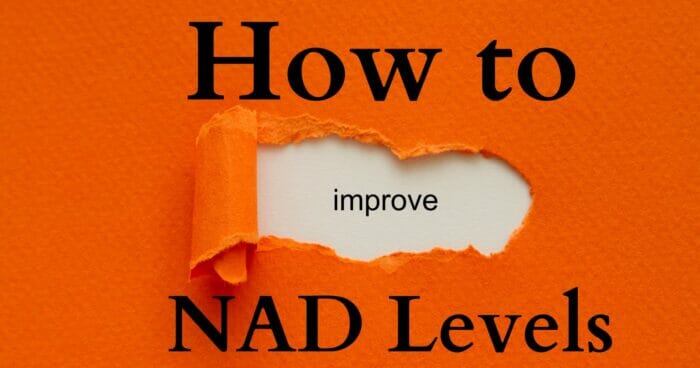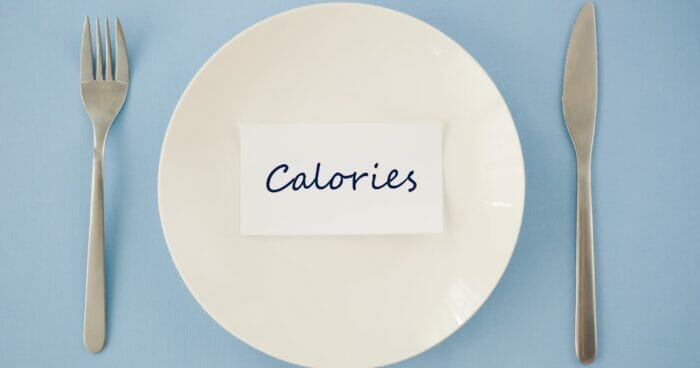NAD+ is vital for our overall healthspan, but the problem is that our NAD levels decrease as we age. Whilst NAD levels are not defined as one of the official hallmarks of aging, they are considered one according to some researchers.

The good news is that there are natural ways to help support and increase your levels of NAD+ in your body to help you age better.
Related: How to Test Your NAD Levels
We look at what are the recommended methods to help improve your NAD+ levels that we could find in both research papers and other popular online references in the list below.
Ways To Improve NAD Levels Naturally
| Method | Description |
|---|---|
| Exercise | Regular physical activity has been shown to increase NAD levels, especially high-intensity interval training (HIIT). |
| Caloric Restriction | Reducing daily calorie intake by about 20-30% without causing malnutrition can increase NAD levels and promote longevity. |
| Managing Sun Exposure | Avoiding excessive sun exposure that can lead to sunburn can help reduce the loss of NAD levels needed. |
| Intermittent Fasting | Intermittent fasting, periodic fasting, or time-restricted eating can increase NAD levels and improve overall health. |
| Niacin-Rich Foods | Consuming foods high in niacin (vitamin B3), such as lean meats, fish, legumes, and whole grains, can help boost NAD production. |
| Supplements | Taking NAD precursors like nicotinamide riboside (NR) or nicotinamide mononucleotide (NMN) can help increase NAD levels. Consult a healthcare professional before taking supplements. |
| Sleep | Maintaining a healthy circadian rhythm to assist your sleep pattern and getting enough rest can help maintain optimal NAD levels. |
| Stress Reduction | Practicing stress reduction techniques like mindfulness, meditation, and yoga can help preserve NAD levels. |
| Limiting Alcohol Intake | Alcohol intake can stress the body, which will require NAD as part of the recovery process and end up with a reduction of NAD levels. |
| Sauna and Cold Exposure | Exposure to contrast temperature from Sauna or cold exposure could help boost NAD biosynthesis. |
What Are the Ways to Improve NAD+ Levels Naturally?
Below you will find a list of the ways to naturally help improve NAD+ levels by either creating more or lowering the potential loss of NAD+ levels in our bodies.
1. Exercise

According to research, performing regular aerobic and resistance training exercise helps signal to your body to make more NAD+ to support your muscles energy needs.
Regular physical activity has antiaging effects and reduces the risk of injuries in older individuals
Source
2. Caloric Restriction

According to research reviewed by Scientific American 5 days of hunger a month might reduce the factors involved in aging and age related diseases.
It would appear that managing your diet is an important factor when trying to boost NAD+ levels.
CR stimulates the NAD+ salvage pathway leading to increased NAD+ bioavailability by activating the expression of NAMPT, which triggers the NAD+ salvage pathway by transforming nicotinamide (NAM) to NAD+
Source
3. Limiting Sun Exposure

Sun exposure is healthy in correct dose exposure to our skin and is vital in helping us make Vitamin D3 for overall health. However, it appears that if we are overexposed and develop sunburn then this causes a stress on the system, which requires more NAD+ to help us repair the DNA damage done by UV light.
Niacin deficiency in humans, which leads to low NAD status, causes sun sensitivity in skin, indicative of deficiencies in responding to UV damage.
Source
4. Drinking Less Alcohol

Alcohol is much debated as to whether any can have a beneficial effect on our health as we age; think of the French Paradox we mentioned on the best anti-aging supplements review.
If you are looking to increase your NAD+ levels then abstaining from any alcohol consumption would appear to help support your body to not deplete its NAD levels.
NAD(+) levels are markedly reduced when blood alcohol levels are high during binge drinking.
Source
5. Eating Foods Rich in NAD+ Precursors

The type of food we consume can help us expose our bodies to more NAD+ precursors, which can help us to make more endogenous NAD+ coenzymes.
Foods like edamame and broccoli have been mentioned before when looking for foods with nicotinamide mononucleotide (NMN), which is a precursor to NAD.
Daily requirements for NAD+ synthesis can be obtained either with dietary tryptophan or with around 15 mg/d of daily niacin, a collective term for nicotinic acid (NA) and nicotinamide (NAM) [61], which can be found in meat, fish, and dairy products [65].
Source
6. Heat and Cold Shocks

Interestingly it would appear some short-term exposure to either hot or cold can assist our bodies in making more NAD+ naturally.
You might have heard famous podcasters like Rhonda Patrick interview researchers like Dr. Jari Laukkanen on how regular sauna bathing may be linked to several health benefits including cardiovascular and cognitive.
Short-term cold exposure is thought to help stimulate brown adipose tissue (BAT), which has health benefits on our mitochondria.
In mouse and human BAT, cold exposure activates NAD+ biosynthesis mediated by a rate-limiting enzyme, NAMPT [148] Source
7. Dietary Supplementation

Nicotinamide is one of two forms of Niacin (vitamin B3) and is a precursor that has been shown to help boost NAD+ levels in humans depending on which type of nicotinamide supplement you take.
Two of the most popular NAD+ supplements that people take are nicotinamide riboside (NR) and nicotinamide mononucleotide (NMN) in order to help raise their NAD+ levels.
Another interesting substance that supports NAD levels is methylene blue as used in Blue Cannatine troches.
8. Optimize Your Circadian Rhythm
NAD+ levels and the nicotinamide phosphoribosyltransferase (NAMPT) enzyme both have circadian oscillations. It might be possible that our NAD+ levels are affected by how healthy our circadian clock is. We know that exposure to things like blue light at night, and avoiding light in the morning can disrupt a person’s natural body clock and affect sleep patterns. So, make sure you work on maintaining a healthy sleep – wake cycle.
9. Stress Management
Chronic mental stress has a negative knock on effect to many other systems in our bodies. Poor management of stress levels can lead to an increase in inflammatory cytokines. Assessing your lifestyle habits, personal relationships or working environment for chronic stress triggers could be a way to help you avoid depleting your NAD+ levels.
10. Intermittent Fasting
Researchers have seen that during periods of energy stress, which is what occurs with intermittent fasting, that the body will increase NAD+ levels and activate sirtuins. So, being conscious of not continuously snacking and eating throughout the day would be another way to help increase NAD+ levels. There are many different types of ways to practice intermittent fasting with eating windows like 16:8 etc..
Sources
- De Guia et al. 2019. Aerobic and resistance exercise training reverses age‐dependent decline in NAD+ salvage capacity in human skeletal muscle
- Poljsak et al. 2020. Healthy Lifestyle Recommendations: Do the Beneficial Effects Originate from NAD+ Amount at the Cellular Level?
- Benavente et al. 2009. NAD in skin: therapeutic approaches for niacin
- French. 2016. Chronic alcohol binging injures the liver and other organs by reducing NAD⁺ levels required for sirtuin’s deacetylase activity
- Rajman et al. 2018. Therapeutic potential of NAD-boosting molecules: the in vivo evidence
- Ramsey et al. 2009. Circadian Clock Feedback Cycle Through NAMPT-Mediated NAD+ Biosynthesis
- Liu et al. 2017. Inflammation: The Common Pathway of Stress-Related Diseases
- Cantó et al. 2010. Interdependence of AMPK and SIRT1 for Metabolic Adaptation to Fasting and Exercise in Skeletal Muscle
- Houtkoope et al. Exploring the therapeutic space around NAD+


